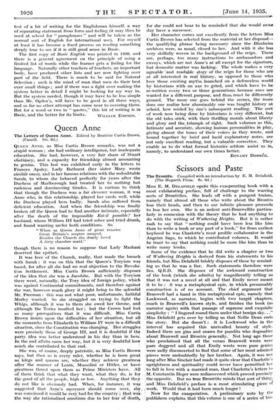Queen. Anne
The Letters of Queen Anne. Edited by Beatrice Curtis Brown. (Cassell. 10s. 6d.) QUEEN ANNE, as Miss Curtis Brown remarks, was not a stupid woman ; she had ordinary intelligence, but inadequate education. She had, however, a very fair share of Stuart obstinacy, and a capacity for friendship all-host amounting to genius. This last was exhibited early in the letters, to Fiances Apsley, Lady Bathurst (her sister Mary wrote similar ones), and in her famous relations with the redoubtable Sarah, to whom she behaved perfectly for years after the Duchess of Marlborough had treated her to- nothing but rudeness and domineering tirades. It is curious to think that though the Duchess was a far cleverer woman, it was Anne who, in this relationship, played her cards well, while the Duchess played hers badly. Sarah also suffered from deficient education. And when the friendship was finally broken off the Queen had to find another intimate, especially after the death of the impossible Est-il possible? her husband, whom William III had tried sober and tried drunk, and found wanting under both conditions. So
" When as Queen Anne of great renown Great Britain's sceptre swayed, Besides the Church she dearly loved A dirty chamber maid."
though there is no reason to suppose that Lady Mashani deserved the epithet.
It was love of the Church, really, that made the breach
with Sarah : it was on this that the Queen's Toryism was based, for after all she had no real objection to the Revolu- tion Settlement. Miss Curtis Brown sufficiently, disposes of the idea that .she was a Jacobite. But with the Toryistn there went, naturally, the Tory idea of foreign policy, which was against Continental commitments, and therefore against the war, however much glory it might bring to the splendid Mr. Freeman : this was not what poor, unfortunate, faithful Morley wanted. So she struggled on trying to fight the Whigs, although it was to them she owed her throne, and although the Tories insulted her ; but the Crown had lost so many prerogatives that it was difficult. Miss Curtis
Brown insists upon the difficulties of her situation, but all the monarchs from Elizabeth to William IV were in a difficult situation, since the Constitution was changing. Her struggles were precisely those of George III, and it is doubtful if the party idea was better understood in his day than in hers. In the end affairs came her way, but it is very doubtful how much she contributed to that end.
She was, of course, deeply patriotic, as Miss Curtis Brown sa.ys, but then so is every ruler, whether he is born great as kings and queens are, whether they achieve greatness at the manner of Lenin, Mussolini or Hitler, or have greatness thrust upon them as Prime Ministers have. All oC them think that what they want, what they do, is fof the good of all the people, high or low. Anything that they do not like is obviously bad. When, for instance, it was suggested that Anne's successor should come over, she was convinced it woiddbe very bad.for. the country.; that wail the way she rationalized emotions due to her fear of death,
for she could not bear to be reminded that she would same day have a successor.
Her character comes out excellently from the letters Miss Curtis Brown has selected from the material at her _disposal— the qualifying phrase being necessary since the Blenheim archives were, as usual, closed to her. And with it she has very skilfully woven in the background of the reign. There are, perhaps, too many instructions to ambassadors and envoys, which are not Anne's at all except for the signature, but domestic matter was lacking: The whole makes a very agreable 'and readable stogy of the reign for those who are
. at all interested in real history, as opposed to those who love those exciting mythsLlaunched on a defenceless world by historians with an axe to grind, and which have to be re-written every two or- three generations -because axes are wanted for a different ,purpose, and thus; must be differently ground. The more one goes behind the scenes., the more does one realize hOw Abominably one was taught history at school, how misled by one's -subsequent reading. The sort of work -now being clae by hiStorians is very different, but the old tales. stick, with their thrilling morals about liberty and glory and the triumph of .right. Such volumes as this, . Intimate and accurate, showing human personalities in play, giving almost the tones of their voices as they wrote, and . bound together by brief and lucid explanatory notes, are not only excellent reading, but a valuable corrective. They enable us to do what formal histories' seldom assist us in, namely, to understand -our own times -better.
BONAMY DOBRAE.


















































 Previous page
Previous page